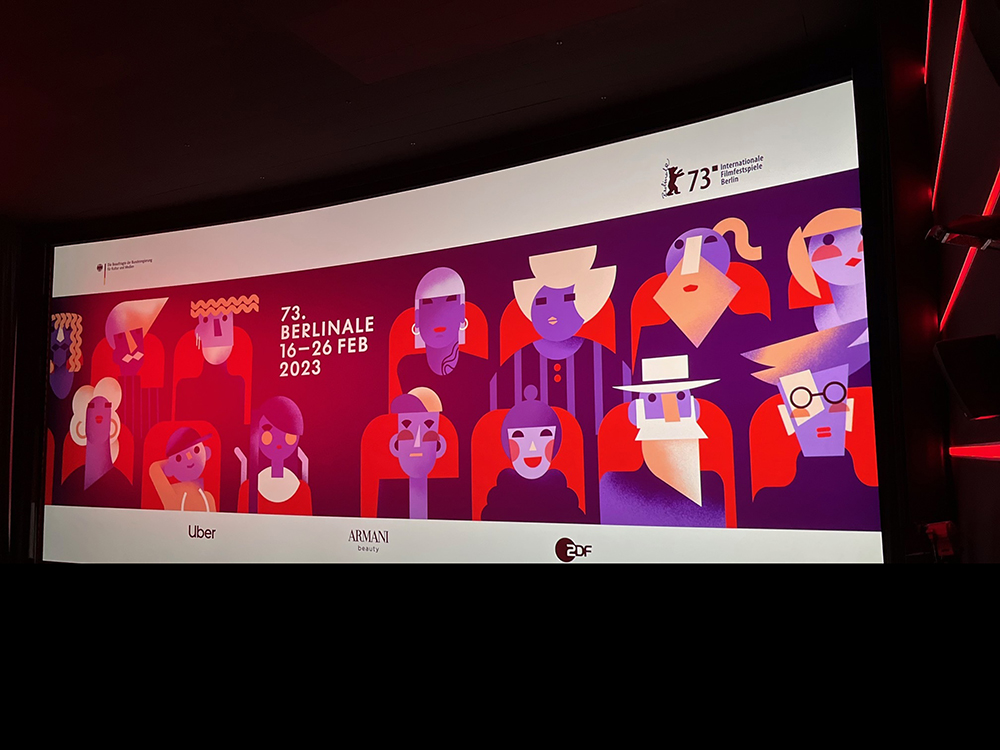Festivals The 73rd Berlin International Film Festival: 16th-26th February, 2023
Directing the program

The 73rd Berlin International Film Festival in February 2023 was the first fully in-person Berlinale event since 2020 so a return to a new normality of sorts. Only taking up their new positions before the outbreak of the Covid pandemic, Executive Director Mariette Rissenbeek and Artistic Director Carlo Chatrian also had to contend with its aftermath, so were hoping to finally have something more settled in their objectives for the 2023 edition. Creating closer ties with the U.S. film industry was one objective and there was also the welcome boost of funding from the German government. Regards the choice of the main program, they explained how their selection attempted to reflect the current global harsh realities with other films providing a respite in the form of escapist viewing.
The festival opened on 16th February 2023 with the customary A-List festival grand red carpet ceremony. The television and stage show was produced by the German public broadcaster ZDF/3Sat, and their filming included the exterior red carpet, the hallway of the Berlinale Palast, and the theatre interiors. The ceremony started at 7.30pm local time and where Mariette Rissenbeek and Carlo Chatrian were joined on stage by Jury President Kristen Stewart, followed by further speakers with their own goodwill sentiments.
The Rebecca Miller directed She Came to Me was the special opening ceremony screening and also keeping in tandem with the intended feel-good escapist part of the program. When a composer in a creative crisis meets a tugboat captain by chance in a Brooklyn Bar an unlikely strong bond grows between the two. The ensuing comedy drama, set against a backdrop of a socially divided America, is both funny and sophisticated with nuances and very plausible characterizations. Peter Dinklage, Marisa Tomei and Anne Hathaway play the leads and shine in their roles, making this a heartening and entertaining way to begin the 2023 edition.
A total eighteen films from around the world competed in the Main Competition for the Silver and Golden Bear, and there were also sixteen films in the second competition, called Encounters. The program in its entirety conspicuously omitted films from Russia this year but Sean Penn’s documentary Superpower represented the omnipresence of the Ukraine conflict. In contrast, films like Honary Bear inductee Steven Spielberg’s The Fabelmans, again, served as a lighter affair for audiences.
Choice Selections and Accolades
One film playing in the main competition, Blackberry, was adapted from the bestselling book “Losing the Signal” by Jacquie McNish and Sean Silcoff. Directed by Matt Johnson, it chronicles the rise and rapid fall of the world’s first Smartphone product, with Glenn Howerton and Jay Buruchel playing the fallen business partners and totally buying into their characters. Also particularly commendable is the art direction that authenticates the period detail from the early 1990s to the late 2000s. Moreover, Blackberry humorously portrays the world of fast-paced business, corruption, and the pressure of staying ahead (or ultimately getting left behind), with an abundance of toxic humor.
After the announcements of the main awards of the 2023 Berlinale, there were other films also deserving of recognition. In the Encounters section, The Klezmer Project was directed by Leandro Koch and Paloma Schachmann. Although it did not win (Here, by Bas Devos, took the prize), it deserves stand-alone appraisal. A frustrated Jewish wedding cameraman in Argentina meets and falls in love with a clarinetist. To spend time with her he contrives a documentary project commission for television and the project will take him across many remote parts of Eastern Europe in a quest to find the lost klezmer melodies that have been safeguarded by the Romani people. The Klezmer Project both educates and fascinates and its original use of adding a linear fictional narrative onto what is otherwise a documentary, therefore combining documentary with meta-narrative, not to mention the road movie, is cleverly and skillfully interwoven. While also being both lo-fi and entertaining, it somehow manages to balance all these elements without causing any confusion in the story development. The Klezmer Project was recognized by winning the GWFF (Gesellschaft zur Wahrnehmung von Film- und Fernsehrechten) society Best First Feature Award, with a prize of 50,000 € guaranteeing the safeguarding of Film and TV rights. A Special Mention from the GWFF was also given to The Bride, directed by Myriam U. Birara and in the Forum Competition section.
Tótem, directed by Lila Aviles, played in the Main Competition section and this Spanish melodrama both charmed and delighted. A family celebrates the birthday of a young father, also a painter, who is sadly facing impending mortality. The child protagonist, played by newcomer Naíma Senties, could easily have won the Silver Bear for Best Leading Performance (the award went to another child protagonist for 20,000 Species of Bees), but Tótem still won the prize of the Ecumenical Jury, finishing ahead of Golden Bear winner On the Adamant, which was awarded Special Mention here.
One film in the Competition also worthy of a prize was Limbo, directed by indigenous Australian director Ivan Sen. A detective called Travis Hurley arrives in a small Australian outback town. Staying at the Hotel Limbo, he has come to investigate a 20-year-old unsolved homicide of an Aboriginal woman, the only evidence being a number of tape recordings. Meanwhile, the victim’s family is reluctant to give much information, particularly to a white cop. Subsequently, and with patience quietly masking anxiety, Travis will uncover some unpleasant truths, highlighting the injustice faced by Aboriginal Australians. Ivan Sen had previously won the Premiere First Feature Award at the Berlinale in 2002 for his first film Beneath Clouds. In Limbo he has created a hypnotic black and white “desert noir” that makes excellent use of the remote landscape panorama to enhance the static progress of narrative resolution.
Shooting Stars at the Berlinale
The 73rd Berlinale European Shooting Stars Awards were presented at a festive gala on 20th February, 2023. The evening awards recognizing new talent were moderated by journalist Nadine Kreutzer. During the weekend before the event, the ten Shooting Stars nominees participated in promotional interviews.
Judith State from Romania had classical ballet training and is now a professional actress, choreographer and dancer. Seeing herself first and foremost as a dancer, in 2016 she made her screen debut in Cristi Puiu’s Sieranevada, considering her involvement in the film as a "beautiful accident". After premiering in Cannes, she was also nominated for a Romanian Gopo Award for Best Supporting Actress. She adds, “Ever since that moment I have been involved and have been lucky to now combine my careers in dance and film.” State received a Gopo Award for Best Actress in Marius Olteanu's 2018 debut film Monsters, and Cristi Puiu’s Manor House in 2020. Both films premiered at the Berlinale and Cristi Puiu also won the Encounters Award for Best Director. In 2020, State also starred in Daniel Sandu's The Father Who Moves Mountains and Liviu Marghidan's Refuge and in 2022 she played the lead role in Cristian Mungiu’s R.M.N., which premiered in Cannes.
Gizem Erdogan was born to Turkish parents who had moved to Sweden in the 1970s. After studying at the Conservatory in Sweden and a couple of years performing on stage, in 2014 she got the part in her debut feature film Dream On where she was nominated for Best Supporting Actress at the Guldbaggen Swedish Academy Awards. In 2020 the TV series Caliphate made her a national star. This is Erdogan’s first participation at the Berlinale and she was very excited to finally come, adding, "I hope Shooting Stars will give me the opportunity to do international co-productions."
Thorvaldur Kristjansson started out in the theatre, admitting there were initially less film opportunities in Iceland. His first film role was Black's Game in 2017, earning him a nomination for Best Actor at the Eddan Icelandic Film and TV Awards. In 2020 he won Best Supporting Actor for a TV Series, The Minister. After more roles his recent film A Letter from Helga topped the Icelandic box office in 2022. Kristjansson is now focusing solely on his film and TV work, saying, "I am afraid of going back to the theatre, to be honest. It is a muscle that you have to exercise." However, with film, he adds, "You have to be in a perfect mode of focus. You need to go out and then go in (again)."
Meanwhile, at the Berlinale, Finnish stage, TV, and film actor Alina Tomnikov won the European Shooting Stars Award for 2023. Her current film is the comedy drama The Worst Idea Ever.
 The Main Prize Winners
The Main Prize Winners
The Berlinale 2023 Award Ceremony took place on 25th February with actress Kristen Stewart serving as President of a seven-person International Jury. The prizes at the Berlinale have been conspicuous in its unusual choices for A-List winners over the last decades and this year was no exception. The Golden Bear for Best Film went to On the Adamant, directed by Nicolas Philibert with the film‘s producers (Céline Loiseau, Gilles Sacuto and Miléna Poylo) being the recipients of the prize. On the Adamant is a documentary that focuses on a day care center on the River Seine in Paris. During the course of the film we progressively learn the bond between the care workers and patients to an intimate and compelling effect.
Christian Petzold has always been a popular director in his home country and not least at the Berlinale. This year he won the Silver Bear Grand Jury Prize for Red Sky (Afire). Four young people are staying in a holiday home on the Baltic Coast. One of them is a writer, struggling to finish his latest book. Meanwhile there are warnings of a heat wave and potential forest fire nearby. Petzold is successful here in making character interactions become a study in existential psychology, particularly the silences or brief exchanges. Also notable is the building of tension in what is conspicuously a slow-paced but nonetheless compelling film.
The Silver Bear Jury Prize was awarded to the Portuguese film Bad Living, directed by João Canijo. It concerns five women who have run an old hotel with the narrative focusing on their ongoing conflicts. When a younger person arrives, old wounds are reopened. Otherwise, the French director (and sometime actor) Philippe Garrel, has for a long time been popular at the Berlinale and beyond, with his films also regularly featuring in competition at Cannes and Venice. This year The Plough deservedly won him the Silver Bear for Best Director for his depiction of the passion and realities of a traveling puppet theater in the modern age. After the father and grandmother die, the remaining family struggles to keep the legacy alive.
Other main awards benefitted from the renowned Berlin accolades for fringe or special interest topics. Sofía Otero was awarded the Silver Bear for Best Leading Performance in 20,000 Species of Bees. At just eight-years-old, Otero has made history as being the youngest Berlinale winner. Directed by Estibaliz Urresola Solaguren, the narrative concerns a distraught child and her mother who experience life changing experiences in a summer house.
Thea Ehre won the Silver Bear for Best Supporting Performance in Till the End of the Night by Christoph Hochhäusler. In this crime thriller, Ehre plays a Trans character just out of prison on probation. Meanwhile, Angela Schanelec received the Silver Bear for Best Screenplay for Music, a perplexing film that will likely divide audiences. Concerning the Oedipus myth and containing little dialogue, its accolade therefore seems somewhat controversial. Finally, the Silver Bear for Outstanding Artistic Contribution was awarded to Hélène Louvart for her cinematography in Giacomo Abbruzzese's Disco Boy. A film not without some flaws, the prize for original cinematography was nonetheless well deserved.
By Steven Yates

